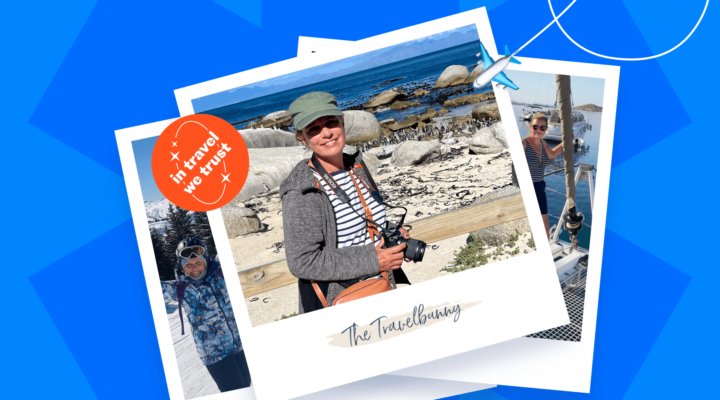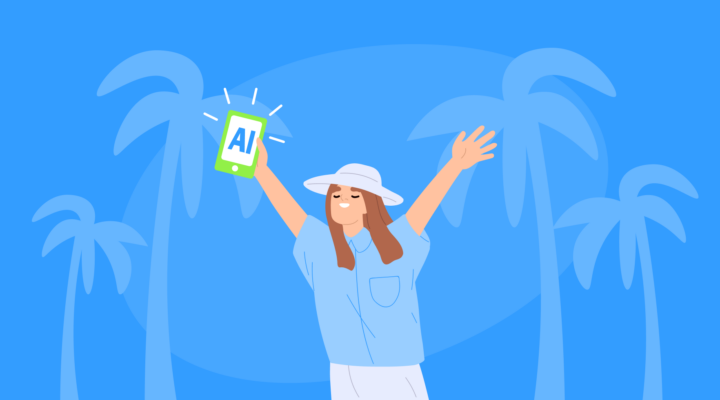1. Think About Monetizing
Your blog will only be your hobby. But you’ll get even more pleasure from the project if it is profitable.
Digital Marketing Specialist Karly de Lange shared with the reader of Jillian Harris’s blog, 7 proven ways to make money through blogging. You can sell consultations, courses, digital products, or physical products under your own brand.
With regard to advertising, you can place a Google Ads block on your website, create content for brands for money, and promote brand offerings with partner tools.
You can try the last option right now. Join Travelpayouts to gain access to the travel affiliate programs of over 100 travel brands on a single platform. Place brand partner tools such as links, widgets, banners or others on your website and receive a cash reward every time when your users purchase brand services.
Join the Travelpayouts Partnership Platform
Access exclusive tools and the best travel partner programs, including flights, hotels, car rental, insurance, tours and activities, all in one place.
Join Today2. You can earn without huge numbers
Ashley and Mike from Joyfully Growing Blog know from their own experience that you can start blogging and earn good money without a massive follower count. Contrary to what many bloggers say about working hard for a few years before your first income starts coming in, Ashley and Mike were able to earn money early in their blogging career with only 5,000 monthly pageviews and landed big partnerships within their first year of blogging.
There are three things that they found crucial for that early success: a professional blog theme, good content with high-quality visuals, and effective outreach.
What can you learn?
You don’t necessarily need to have massive performance numbers to start earning. If you try to achieve high quality in everything that you do, landing partnerships with brands and other bloggers will be easy.
3. Treat your blog seriously
As Lauren from the Sobremesa Stories travel blog shared, it’s very important to treat your blog seriously from the start. Try to achieve the highest quality in everything: posts, images, videos, design, and so on. In this case, promoting your blog will be easy, as you will be excited to share it with people.
What can you learn?
Treating your website as a serious business is the best way to start a blog. Try to achieve high quality in everything that you do, so blog growth comes naturally as a result of your hard work.
4. Pick a good domain name
Sharon from Where’s Sharon and Digital Nomad Wannabe believes that selecting a good domain name is half the battle. Where’s Sharon first seemed fun, but turned out to be limiting as it didn’t reflect what Sharon was blogging about. Digital Nomad Wannabe also wasn’t the best choice. At that time, it perfectly described what Sharon was striving to become, but now it doesn’t properly describe her audience.
What can you learn?
Think about your domain name in the long term, because changing it later may not be easy.
Consider:
- Length: Keep your domain name short and sweet.
- Spelling: Your domain name should be easy to spell so that users can find you without any issue.
- Niche: Should your domain reflect your niche or be generic?
- Availability: Make sure to have the same name across all accounts, including your social media pages.
Last but not least, try to use a “.com” domain. This will rank on Google faster and drive traffic worldwide. Country-specific domains can also be a good choice, unless you think you will decide to scale your business later.
5. Choose a reliable hosting
According to Nicole Bianchi, investing in reliable hosting is one of the most important things to do before starting a blog. Her mistake was choosing cheap hosting, as she didn’t anticipate attracting so much traffic. However, that server wasn’t able to protect her site from malware and handle the high level of traffic. Moving to a secure, high-speed host allowed for her website to load lightning-fast and removed all the malware that was affecting her.
What can you learn?
Choose secure and reliable hosting that will protect your websites and be able to handle traffic spikes. Always be prepared for your website to go viral. 🙂
6. Start with a few posts
Ana from The She Approach recommends preparing several posts before your website launch date. She spent a lot of time perfecting her website’s design, so she only wrote four posts to start with. When the launch day came, traffic started coming in, but due to minimal content on her blog, the bounce rate was high. People left the website because there wasn’t much for them to see and the posts that were actually published didn’t explain what the blog was about.
What can you learn?
If you want to make an impression with your website launch, be sure to prepare enough content to start with. Five to ten posts is a good number to begin with.
7. Edit your images
Kiersten from The Blonde Abroad believes that bloggers should pay particular attention to image quality. At the very beginning, she used to publish photos from her cellphone. Over time, she learned the importance of taking professional pictures and optimizing them to make her blog look more professional.
What can you learn?
Quality images will show your professionalism and make your website stand out.
- Optimize images to make your website load faster. Keep in mind that big images will slow it down and lead to a poor user experience.
- Improve image aesthetics. Presets can improve your image style and overall aesthetic, while reducing editing time.
8. Copyright your photos
Sandy from S Marks The Spots finds it important to copyright your photos. After repeatedly finding her images being used by other businesses without permission or credit, Sandy decided to start copyrighting any pictures that she posted on her blog.
What can you learn?
To protect your photos from spreading all over the Internet without credit, make sure to copyright them. For some bloggers, claiming compensation for the unauthorized use of their photos can even become another potential income stream.
8. Be ready to invest money
Helene from Helene In Between regularly invests in her blog’s development. While savvy, at some point, doing everything on her own began to cost too much time and effort. As a result, Helene started purchasing products, services, and courses to facilitate her work. For example, a photography course she took was a game-changer, as Helene learned how to use a camera and edit photos. This was massively important for her travel blog, as photos are a large part of the overall experience for users.
What can you learn?
Research tools and courses that can improve your skills and help your business grow. Here is what Helene recommends investing in for your blog:
- A newsletter is a great way to drive traffic to your blog and earn an income. Take advantage of email marketing tools to automate processes and save time.
- Blogging platforms, such as WordPress, can be the best place to start a blog because they offer many useful features and are easy to use.
- Courses can put your goals into perspective and help you build new skills.
10. Learn about SEO early
Sophie from Solo Sophie highlights the importance of learning SEO from the beginning of your journey. She saw firsthand how crucial this was for her blog’s growth. For her first 18 months of blogging, Sophie didn’t do much SEO, as it seemed too hard. However, search engine optimization is one of the main growth factors for any blog and, today, Sophie starts keyword research before even writing a new article.
What can you learn?
Start learning SEO from the get-go. There are many tools that will automate optimization, such as the Yoast plugin, which will help you optimize each post. You can write alt text for blog images, add keywords in URLs and throughout posts, and so on.
11. Take advantage of Pinterest
Tiffany from Saving Talents shared in this interview that Pinterest is one of the most important promotional strategies for bloggers. It’s important to figure out how Pinterest works and be active on the platform as it can drive tons of traffic to your blog.
What can you learn?
Research and join blogging groups in your niche as well as read posts from other bloggers to better understand how it all works. Also, make sure to network. This will provide you with not only traffic, but also support within these groups.
12. Be consistent
Taylor Coley from Taylor Conyc believes consistency is 90% of business success. At first, she strived to post bi-weekly, but would occasionally miss this deadline. This resulted in readers losing interest in her blog, as some visitors felt they couldn’t depend on her for regular content. Once Taylor began posting regularly, she saw consistent growth. Now, she posts weekly, as this is a great frequency to hold people’s interest.
What can you learn?
Consider your availability and resources, as well as your target audience’s preferences, and decide on your posting frequency. Publishing new posts occasionally won’t drive consistent traffic. For many bloggers, one blog post per week is an ideal frequency.
13. Blogging takes effort
Neha Sharma from Nomadic Dreamz stresses that blogging requires time and effort. Aspiring bloggers shouldn’t think that it’s an easy job. Quite the opposite, they’ll need to research, write, edit, publish, and promote their blog.
What can you learn?
Unless you’re already a niche expert, prepare to work hard to grow your business. Not only that, you also need to be consistent and patient, as you won’t have many readers to give you feedback in the beginning.
14. Don’t get discouraged without support
Travel blogger and photographer, Amber Primdahl, shares that, at first, you might not get support from the people around you, as blogging is still not widespread around the world. For example, his family was really worried that he wouldn’t earn a decent income with his blog, but as it started to gain more traction, they became more understanding.
What can you learn?
You should be prepared to work hard on your own for some time. However, as blogging has become a more common job nowadays, it’s easier to meet like-minded people and get support from a community.
15. Believe in yourself
Lisa, the voice behind Fjords and Beaches, believes that striving for unachievable goals may be the best way to succeed. Full-time travel blogging often involves networking, which can be quite challenging. Thus, Lisa pitched to other bloggers countless times and received no response. This was pretty discouraging. However, one of her main successes was to learn how to not lose faith in herself. In the end, persistence and writing a great pitch helped Lisa land deals with some top-notch brands and travel groups.
What can you learn?
Whatever aspect of blogging you’re working on, remember to believe in yourself and never give up. Try to find a unique approach to everything that you do that aligns with your personality and will help you find like-minded people.
16. Don’t plan, just do
Adam Enfroy knows that aspiring bloggers often feel overwhelmed when planning a new blog. In much the same way, back in 2016, he created a dropshipping website and spent a lot of time planning his branding, logo, design, promotional channels, etc. Trying to perfect every little detail on the surface took so much time that he couldn’t properly build backlinks, a network, and so on.
What can you learn?
Launching a website isn’t the endpoint, but the beginning. Don’t spend all your energy on planning the perfect launch. Instead, take real action that will drive traffic, such as writing content, promoting your blog, outreaching, and so on. You can always tweak your posts later.
17. Learn from the best
At some point, Miriam was working hard on her blog, but didn’t achieve any results until she found a blogging mentor. In just one month, her follower count and blog traffic doubled.
What can you learn?
You don’t have to find a mentor to achieve your objectives and grow a blog, but learning from the best experts in the niche can help greatly. They already know which strategies work and which don’t, so you can skip the trial-and-error part.
18. It’s okay to grow and change
Arabella from Lost in the Story shared that it’s natural for you to grow over time, which may change your preferences and interests. For example, the niche she’s working in now is different from the one she began with some years ago. Arabella started blogging by sharing her story of recovering from anorexia and overcoming mental health issues. At some point, it became hard to keep the ball rolling, so, following the advice of a friend, Arabella started posting book reviews and sharing writing advice. This sparked her enthusiasm once again and allowed Arabella to continue blogging.
What can you learn?
If your niche doesn’t work for you anymore, it’s okay to change your focus to something more exciting. Without passion, it will be hard to keep blogging for much longer.
How do I prepare to start a blog?
There are many things to keep in mind and monetization is definitely one of the questions to ask before starting a blog. If you take blogging seriously (from content creation to promotion to networking), it won’t be long until traffic starts coming in, along with monetization opportunities. Consider in advance how you’ll earn money with your blog and then develop your strategy accordingly. Take advantage of the best practices of other bloggers to boost your growth and avoid making the same mistakes.




